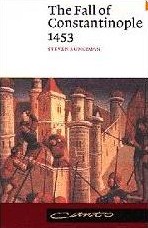Steven Runciman
The Fall of Constantinople 1453

Editado por Cambridge University Press, edición, la mía de 1965. Verdadero raudal de información y aventuras, de naciones y religiones enfrentadas, de civilizaciones en ascenso -la otomana- a través del imperialismo y la guerra, y de otras en descenso -la cristiana- a través de la división ortodoxa y católica y de rivalidades nacionales mil. Sobre todas las facetas colectivas de pueblos y religiones emerge glorioso el papel individual de algunos hombres, los líderes. Conoceremos a los voluntarios desplazados a Constantinopla a defender a la ciudad sitiada: genoveses, venecianos, griegos, e incluso una colonia catalana bajo Père Julia. Conoceremos a un aventurero escocés que andaba por libre, y a otro castellano, un tal don Francisco de Toledo. Qué grandes aventuras las personales de estos hombres, unidos todos en una aventura de civilizaciones enfrentadas, de naciones rivales pero unidas por un mismo enemigo. La historia no sería GRANDE si no la hicieran grandes personajes.
Sigue un extracto, resumido, del momento culminante de la narración:
"At 1AM the sultan launched the final attack on Constantinople. He would wear them down before risking his best troops in the battle. It was his irregulars, the Bashi/bazouks, whom he first sent forward. There were many thousands of them, adventurers from every country and race, many of the Turks but many more from Christian countries, Slavs, Hungarians, Germans, Italians and even Greeks, for the pay and the booty promised. Most of them provided their own arms. Mehmet II placed behind them a line of military police, armed with thongs and maces, whose orders were to urge them on and strike and chastise any who showed signs of wavering. Behind the military police were the sultan's own Janissaries. At the corner of the Blachernae wall there was , half-hidden by a tower, a small sally-port known as the Kerkoporta (…) but someone returning from a sortie forgot to bar the little gate after him. Some Turks noticed the opening and rushed through it into the courtyard behind it and began to climb up a stairway leading to the top of the wall (…) at that moment a worse disaster occurred (…) a shot fired at close range from a culverin struck Giustiniani and pierced his breastplate (…) Giustiniani's nerve was broken; he insisted on flight (…) they placed him on a Genoese ship. His troops noticed his going (…) most of them concluded that the battle was lost (…) The emperor and his Greeks were left on the field alone. (…) The Greeks resisted tenaciously. But the weight of numbers forced them to the inner wall. (…) Constantine turned his horse and galloped back to the Lycus valley and the breaches in the stockade. With him was his gallant Spaniard who claimed to be his cousin, don Francisco of Toledo (…) Thephilus Palaeologus and faithful comrade-at-arms, John Dalmata. Together trey tried to rally the Greeks, in vain (…) The gate was jammed with Christian soldiers trying to make their escape, as more and more Janissaries fell on them. Theophilus shouted that he would rather die than live and disappeared into the oncoming hordes. (…) Prince Orhan and his Turks fought on knowing what fate would await them if they fell into the sultan's hands; and the Catalans stationed below the old Imperial Palace resisted until they were all captured or slain (…) The Catalan consul, Péré Julia, was also executed, with five or six of his fellow-Catalans."
